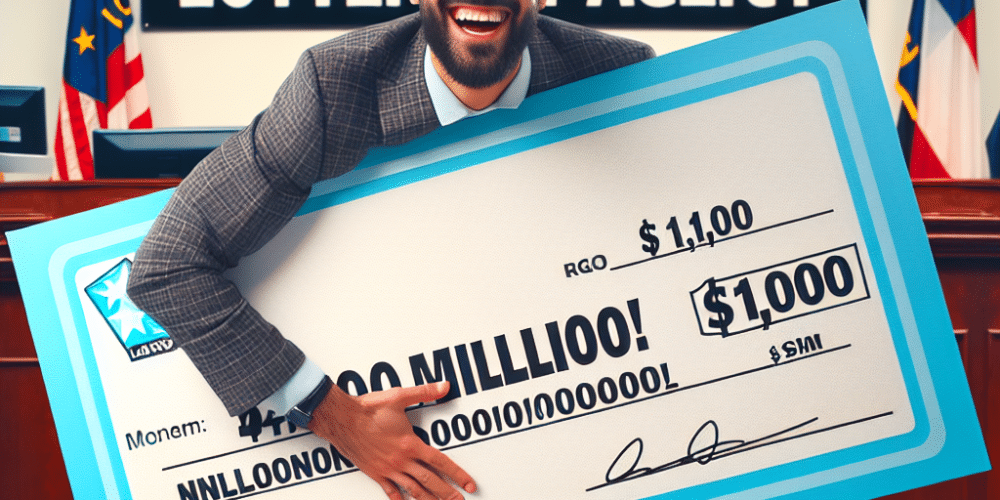The North Carolina Education Lottery recently celebrated its latest winners, among them a Charlotte resident who claimed a $1 million prize from the lottery. The fortunate winner, Kenneth Locklear, secured his windfall through the lottery’s $30 MAX-A-MILLION scratch-off ticket. Purchased at the Gate convenience store on Lawyers Road in Stallings, the ticket promised the top prize that Locklear successfully claimed.
Opting for the immediate financial benefit, Locklear chose the lump sum payout option, which amounted to $600,000 before taxes. Post-taxation, he walked away with $430,508, as confirmed by officials from the NC Education Lottery. This choice reflects a common decision among lottery winners who prefer a sizable immediate payout over prolonged annuity payments, which in this case, would have provided $50,000 annually over 20 years.
The MAX-A-MILLION game started with 25 top-tier $1 million prizes and 10 additional $100,000 payouts. With Locklear’s win, the lottery has 18 top prizes and 7 prizes of $100,000 still available, highlighting the ongoing appeal and potential for players seeking significant returns on their gaming investments.
In a separate notable win, Needham Wiley Jr. from Smithfield claimed a $250,000 prize in a second-chance game. This win came from the third of four 2025 Multiply The Cash Second Chance drawings. The odds were steep, with 36.7 million entries competing in the October 8 drawing, but Wiley emerged victorious. After taxes, his prize amounted to $179,375, a testament to the enduring allure of lotteries and the hopes of countless participants for financial transformation.
The North Carolina Education Lottery continues to be a significant contributor to the local economy, with proceeds benefiting educational programs throughout the state. The lottery’s consistent generation of substantial prize pools not only stimulates local businesses where tickets are sold but also contributes to the dreams of individuals who might find themselves in Locklear’s or Wiley’s fortunate position.
From an economic perspective, lotteries like North Carolina’s present an interesting dynamic. While some argue that lotteries can act as a regressive form of entertainment, disproportionately attracting lower-income participants, others highlight their role in funding critical state initiatives, particularly in education. This dual nature fuels ongoing debates about the societal impact of state-run lotteries.
Critics of lottery systems often point to the low probability of winning and the psychological impact of gambling, suggesting that the allure of life-changing wins might overshadow the statistical improbability of such outcomes. They advocate for more regulations and support for responsible gaming to protect vulnerable populations.
In contrast, proponents argue that these systems are voluntary and provide a unique form of entertainment while also serving as a valuable revenue stream for public projects. The transparency of lottery operations and the distribution of proceeds towards beneficial causes help mitigate some of the concerns raised by critics.
Adding to the national narrative, another significant lottery win was reported in New Jersey, where a player captured a $1.6 million prize from the 53rd Jersey Cash 5 jackpot. Such wins continually capture public attention, offering narratives of unexpected windfalls and the transformative potential of luck.
In conclusion, the stories of Kenneth Locklear and Needham Wiley Jr. not only highlight the personal achievements of lottery winners but also underscore the broader societal and economic roles that lotteries play. As more players try their luck, the balance between entertainment, economic contribution, and ethical considerations remains a complex but compelling aspect of state-run lotteries.

Garry Sputnim is a seasoned journalist and storyteller with over a decade of experience in the trenches of global news. With a keen eye for uncovering stories that resonate, Alex has reported from over 30 countries, bringing light to untold narratives and the human faces behind the headlines. Specializing in investigative journalism, Garry has a knack for technology and social justice issues, weaving compelling narratives that bridge tech and humanity. Outside the newsroom, Garry is an avid rock climber and podcast host, exploring stories of resilience and innovation.
















